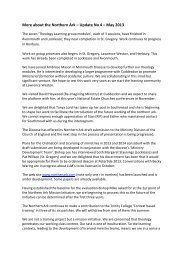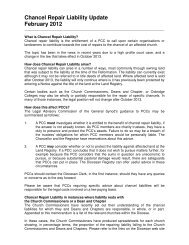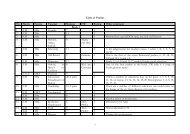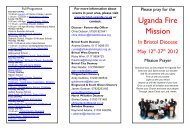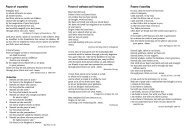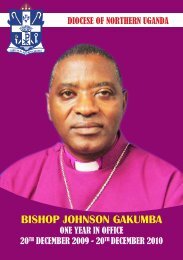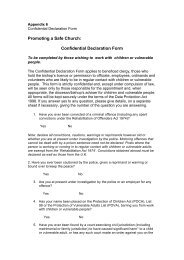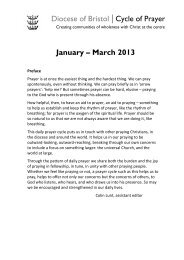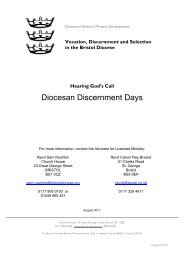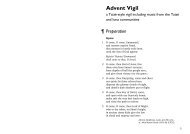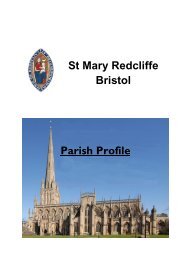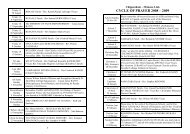assessment grid incumbent
assessment grid incumbent
assessment grid incumbent
Create successful ePaper yourself
Turn your PDF publications into a flip-book with our unique Google optimized e-Paper software.
ASSESSMENT GRIDS: INCUMBENT LEVEL<br />
Basic knowledge – what you should know about it Performance criteria – how you should do it<br />
Performance evidence – what you did Range – variety of situation in which you should be able to do it<br />
VOCATION AND MINISTRY WITHIN THE CHURCH OF ENGLAND<br />
Learning outcome Basic knowledge Performance criteria Performance<br />
evidence<br />
Be able to give an Firm in their personal Able to relate the<br />
account of their sense of their calling of outworking of vocation<br />
vocation to ministry God to ordained to ordained ministry in<br />
and mission and their ministry.<br />
the church, community<br />
readiness to receive<br />
and personal life.<br />
and exercise<br />
ordained ministry as<br />
a priest within the<br />
Church of God<br />
a readiness to<br />
exercise oversight<br />
and leadership<br />
Demonstrate<br />
proficiency in the<br />
skills needed to<br />
exercise leadership<br />
and supervision of<br />
others in a position of<br />
responsibility by<br />
being able to show<br />
sophisticated skills<br />
as an effective<br />
reflective practitioner<br />
and the capacity to<br />
develop these further<br />
Understanding of the<br />
requirements of the role<br />
of Incumbent within the<br />
C of E, with particular<br />
reference to leadership<br />
and oversight.<br />
Principles of acting as a<br />
reflective practitioner,<br />
using of variety of<br />
disciplines eg theology,<br />
psychology<br />
Engages in a ministry<br />
that includes leadership<br />
and oversight showing<br />
the ability to function as<br />
an Incumbent within the<br />
C. of E.<br />
Reflects upon their own<br />
ministry and that of the<br />
church, in a way that<br />
leads to changed<br />
actions.<br />
Reflection from<br />
candidate and training<br />
<strong>incumbent</strong> articulating<br />
the working out of<br />
God’s calling to<br />
ordained ministry<br />
during the curacy.<br />
Account from training<br />
Incumbent and others<br />
of their readiness to<br />
fulfill a calling to the<br />
role of the Incumbent.<br />
Account from self of<br />
reflective process and<br />
from others of the<br />
nature of changed<br />
actions<br />
Range<br />
Works out vocation to<br />
ordained ministry in church,<br />
community and personal<br />
settings.<br />
A variety of Church and<br />
community settings.<br />
Reflection in a range of<br />
disciplines eg theology,<br />
psychology, sociology:<br />
applying these skills in a<br />
variety of church and<br />
community settings
VOCATION AND MINISTRY WITHIN THE CHURCH OF ENGLAND (continued)<br />
Learning outcome Basic knowledge Performance criteria Performance evidence Range<br />
Demonstrate working<br />
understanding of legal<br />
and canonical<br />
responsibilities of<br />
those having oversight<br />
and responsibility<br />
Canon law, Church<br />
representation rules,<br />
legal responsibilities<br />
relating to Church<br />
organization<br />
Conduct all aspects of<br />
ministry with reference<br />
to legal constraints<br />
where appropriate<br />
Account from Training<br />
Incumbent, Church<br />
Wardens and others of<br />
the demonstration of the<br />
working understanding<br />
of legal and canonical<br />
responsibilities<br />
Marriage regulations,<br />
health and safety<br />
regulations. In<br />
application to worship,<br />
buildings and grounds,<br />
statutory meetings and<br />
records, occasional<br />
Administrative<br />
responsibilities of<br />
those having oversight<br />
and responsibility<br />
Demonstrate skills in<br />
presiding in public<br />
worship in the<br />
congregation(s) in<br />
ways that foster rich<br />
corporate worship<br />
Understands the details<br />
of administrative<br />
requirements of Church<br />
life eg church notices,<br />
rotas<br />
Understanding of the<br />
nature of worship.<br />
Understanding of the<br />
nature and use of<br />
liturgy, in particular that<br />
authorized or allowed<br />
within the C of E.<br />
Understanding of the<br />
nature of the<br />
sacraments and their<br />
importance within the<br />
Christian life.<br />
Understanding of the<br />
nature and importance<br />
of the ministry of the<br />
word.<br />
Is diligent in respect of<br />
administration,<br />
communicating to others<br />
where necessary<br />
Preside in public<br />
worship in a way that<br />
fosters rich corporate<br />
worship, taking account<br />
of local context and the<br />
traditions of the C of E<br />
and engaging with lay<br />
people within their own<br />
leadership roles.<br />
Account from Training<br />
Incumbent, Church<br />
Wardens and others of<br />
the demonstration of the<br />
understanding of<br />
administrative<br />
responsibilities.<br />
Accounts of acts of<br />
worship that the<br />
individual has led<br />
including critical<br />
reflections form<br />
themselves and others<br />
offices etc<br />
Communications, filing,<br />
data protection, rota,<br />
cleaning and<br />
maintenance,<br />
A variety of acts of<br />
worship including, allage,<br />
different church<br />
traditions,<br />
Eucharistic/non-<br />
Eucharistic, formal and<br />
informal, BCP and<br />
Common worship, fresh<br />
expressions, inside and<br />
outside of church<br />
including collective<br />
worship in schools<br />
16
VOCATION AND MINISTRY WITHIN THE CHURCH OF ENGLAND (continued)<br />
Learning outcome Basic knowledge Performance criteria Performance evidence Range<br />
Demonstrate ability to<br />
take a leading role in<br />
working with other<br />
partners representing<br />
the church in public<br />
life and other<br />
institutions<br />
Accounts of taking a<br />
leading role in working<br />
as a church<br />
representative with other<br />
partners,<br />
Working with other<br />
faith leaders where<br />
possible.<br />
Demonstrate the<br />
ability to work<br />
ecumenically<br />
And to encourage<br />
ecumenical cooperation<br />
Understanding of the<br />
place and role of the<br />
Church, and the C of E<br />
in particular, within<br />
contemporary society.<br />
Understanding of the<br />
possibilities for<br />
partnership with other<br />
organizations and with<br />
government.<br />
Understanding of other<br />
faiths and their<br />
expression within<br />
contemporary society in<br />
England.<br />
Understanding of the<br />
distinctive nature and<br />
practices of other<br />
denominations.<br />
Understanding of the C<br />
of E’s place within the<br />
whole church of God<br />
and our duty to express<br />
our unity in Christ.<br />
Understanding of the<br />
possibilities and<br />
constraints in working<br />
with other<br />
denominations<br />
Networking with others<br />
to promote kingdom<br />
values. Acting as a<br />
leader within the<br />
community. Is able to<br />
conduct themselves as<br />
a minister in public<br />
settings in a manner that<br />
is sensitive to context<br />
whilst maintaining their<br />
own distinctive stance<br />
Working with and<br />
engaging with leaders of<br />
other faiths in a way<br />
which shows respect<br />
and understanding and<br />
builds up community.<br />
Works ecumenically<br />
showing respect for the<br />
beliefs and practices of<br />
others<br />
Proactively encourages<br />
ecumenical co-operation<br />
at ministerial and lay<br />
levels<br />
Accounts of working<br />
with other faith leaders<br />
where possible.<br />
Account by self or<br />
ecumenical partners of<br />
ecumenical working and<br />
understanding<br />
Co-operative working<br />
can be described by self<br />
or others.<br />
Where opportunities<br />
present for public<br />
ministry eg civic<br />
services, Remembrance<br />
services organized by<br />
civic authorities, working<br />
with county schools,<br />
residential homes,<br />
healthcare professionals<br />
and local government<br />
bodies, the voluntary<br />
sector and businesses.<br />
Interfaith forums,<br />
opportunities for<br />
collaborative working<br />
where possible projects<br />
embrace kingdom<br />
values<br />
Work in partnership with<br />
ecumenical colleagues<br />
in local witness and<br />
ministry eg leading<br />
ecumenical worship,<br />
working together in joint<br />
projects<br />
Working together in<br />
mission and ministry<br />
where opportunities are<br />
available.<br />
17
SPIRITUALITY<br />
Learning outcome Basic knowledge Performance criteria Performance evidence Range<br />
Demonstrate loving<br />
service in the church<br />
… in personal<br />
discipleship<br />
What personal<br />
discipleship is and the<br />
gospel imperative for<br />
servant ministry<br />
Accounts from self and<br />
others of loving service,<br />
demonstrating humility<br />
and grace<br />
in diaconal and<br />
priestly ministry<br />
in collaborative<br />
leadership<br />
and oversight of<br />
others<br />
In faithful response to<br />
the leading of the Holy<br />
Spirit<br />
Understanding of the<br />
nature of ordained<br />
ministry. as one of<br />
service with and behalf<br />
of the church in the<br />
service of the kingdom<br />
and community<br />
Comprehension of a<br />
range of understandings<br />
of the nature of<br />
collaborative leadership<br />
Understanding of the<br />
Episcopal nature of the<br />
role of the Incumbent<br />
and similar ministers in<br />
relation to the oversight<br />
of others<br />
Understanding of<br />
doctrine of the Holy<br />
Spirit as active in the<br />
Church, the individual<br />
and the world<br />
Appropriate loving<br />
service as a Christian<br />
disciple is discerned and<br />
acted upon, service that<br />
is for the benefit of the<br />
other, respects personal<br />
boundaries and does<br />
not create dependency<br />
Appropriate loving<br />
service as a Deacon or<br />
Priest is discerned and<br />
acted upon, service that<br />
is for the benefit of the<br />
other, respects personal<br />
boundaries, enables the<br />
other and does not<br />
create dependency<br />
Styles of leadership are<br />
developed that involve<br />
working with others in a<br />
way that enables the<br />
gifts, experience and<br />
insights of all to be used<br />
for the common good.<br />
Engages in oversight<br />
that guides, enables and<br />
encourages others<br />
Takes actions in ministry<br />
in response to the<br />
promptings of the Spirit<br />
that promote the fruits of<br />
the Spirit.<br />
SPIRITUALITY (continued)<br />
18<br />
Account from self and<br />
others of how this role<br />
has led to loving service<br />
Accounts from those<br />
involved in collaborative<br />
working under curate’s<br />
leadership and others in<br />
positions of authority<br />
within the church<br />
Accounts from those<br />
experiencing the<br />
oversight and Training<br />
Incumbent.<br />
Accounts from Training<br />
Incumbent and other<br />
colleagues and others of<br />
process of personal<br />
reflection and<br />
discernment<br />
Engages in loving<br />
service, as part of<br />
personal discipleship in<br />
a wide variety of<br />
settings, in the local<br />
church and the<br />
community including the<br />
mundane and menial.<br />
Engages in loving<br />
service, within role as<br />
Deacon or Priest in a<br />
wide variety of settings,<br />
in the local church and<br />
the community,<br />
including the mundane<br />
and menial.<br />
Engages in<br />
collaborative leadership<br />
in a variety of ways eg<br />
of a working group<br />
within church or<br />
community, of acts of<br />
worship involving lay<br />
leadership,<br />
Engages in effective<br />
oversight of others<br />
engaged in pastoral and<br />
leadership activities<br />
Takes time to listen to<br />
the promptings of the<br />
Spirit in prayer, through<br />
scripture, through the<br />
words of others.
Learning outcome Basic knowledge Performance criteria Performance evidence Range<br />
Show evidence of a<br />
life and ministry<br />
formed, sustained<br />
and energised by<br />
trust in and<br />
dependence on the<br />
gifting and grace of<br />
God<br />
Understanding of the<br />
grace of God, as<br />
described in Biblical texts<br />
and exegesis, in within<br />
systematic theology and<br />
in accounts of Christian<br />
experience.<br />
Understanding of<br />
Christian discipleship as<br />
dependent upon that<br />
Reliance upon God and<br />
upon his gifting are the<br />
means by which ministry<br />
is sustained, rather than<br />
reliance upon other<br />
factors such as the<br />
fulfilment of personal<br />
need.<br />
Personal account of<br />
spiritual journey as a<br />
Christian. Personal<br />
evidence of Biblical<br />
study for devotional<br />
purposes. Accounts<br />
from others using<br />
evidence from priesting<br />
and personal encounter.<br />
Has been able to<br />
articulate dependence<br />
and trust upon God in<br />
personal conversation,<br />
within group settings, in<br />
preaching and in<br />
testimony to others.<br />
Form and sustain a<br />
life of prayer that<br />
provides<br />
sustenance for the<br />
strains and joys of<br />
leadership<br />
grace.<br />
Understanding the<br />
necessity for prayer as<br />
the foundation of<br />
Christian discipleship.<br />
Understanding of the<br />
nature of prayer and<br />
different forms of prayer.<br />
Understanding of different<br />
patterns of prayer that<br />
sustain in leadership<br />
Prayer in a variety or<br />
forms, corporate and<br />
individual provides the<br />
chief sustenance for<br />
ministry.<br />
Be able to describe a<br />
daily and weekly pattern<br />
of prayer and additional<br />
support that has been<br />
used e.g. retreats,<br />
Spiritual Director. Be<br />
able to describe a<br />
spiritual journey.<br />
Pattern of prayer<br />
includes;<br />
Daily devotion<br />
Corporate worship at<br />
least weekly, retreat<br />
time, peer support eg<br />
Spiritual Director, Cell<br />
group<br />
19
PERSONALITY AND CHARACTER<br />
Learning outcome Basic knowledge Performance criteria Performance evidence Range<br />
Show insight,<br />
openness, maturity,<br />
integrity and<br />
stability in the<br />
pressure and<br />
change entailed in<br />
public ministry<br />
Self-knowledge and<br />
theological<br />
understanding to provide<br />
a model for the<br />
community.<br />
Ability to judge<br />
appropriateness of<br />
change<br />
Account from self of<br />
reflective process and<br />
from others on relation to<br />
developing role in ministry<br />
and evidence from lay<br />
and ordained colleagues<br />
Be able to facilitate<br />
and enable change<br />
Engage with others<br />
to reflect with<br />
insight on a<br />
personal style of<br />
leadership, its<br />
strengths and<br />
weaknesses in<br />
context, and<br />
demonstrate<br />
appropriate<br />
development<br />
Understanding of models<br />
of change management<br />
Styles of leadership in<br />
ministry in relation to<br />
understanding of self as<br />
leader in the context of<br />
the needs of the<br />
community<br />
Facilitates change in<br />
church and communal<br />
settings<br />
Reflects effectively on<br />
ministerial style,<br />
strengths and<br />
weaknesses, integrating<br />
and sifting where<br />
appropriate, and as a<br />
result models reflection in<br />
ministry and initiates<br />
development in others.<br />
Account from self and<br />
from others involved in<br />
change management<br />
Account from self of<br />
reflective process in<br />
relation to developing<br />
leadership in ministry and<br />
evidence from lay and<br />
ordained colleagues<br />
Public ministry and<br />
ministry to groups and<br />
individuals<br />
Settings in larger and<br />
smaller church<br />
community contexts<br />
Engagement in church<br />
ministerial review<br />
processes and in those<br />
initiated by self<br />
20
PERSONALITY AND CHARACTER (continued)<br />
Learning outcome Basic knowledge Performance criteria Performance evidence Range<br />
Exercise<br />
appropriate care of<br />
self, through<br />
developing<br />
sustainable<br />
patterns of life and<br />
work, and effective<br />
support networks<br />
Realistic understanding<br />
of self, of personal and<br />
professional needs, what<br />
gives and takes energy.<br />
Commitment to<br />
establishing appropriate<br />
support networks.<br />
Account from self and<br />
from colleagues<br />
facilitate the<br />
appropriate care of<br />
colleagues<br />
Models of support for<br />
others<br />
and<br />
understanding of<br />
diversity of needs of<br />
others<br />
Able to be creative and<br />
flexible in patterns of selfcare,<br />
to model the value<br />
of such patterns in public<br />
ministry and speak<br />
prophetically to the<br />
prevailing culture.<br />
Building creatively on<br />
supportive networks, as a<br />
result of which<br />
accountability and<br />
freshness are<br />
maintained, and reflected<br />
in public ministry.<br />
Experienced as a<br />
supportive and<br />
constructively critical<br />
colleague<br />
Account from self, key<br />
figure in support network<br />
and from colleagues<br />
supported<br />
Appropriate pattern of<br />
days off and holiday;<br />
one-to-one and<br />
corporate patterns to<br />
support self<br />
Incumbent, other<br />
colleagues, lay and<br />
ordained, and key<br />
relationships in wider<br />
community<br />
21
RELATIONSHIPS<br />
Learning outcome Basic knowledge Performance criteria Performance<br />
evidence<br />
Form and sustain Understands that the Actively seeks, Accounts from self and<br />
relationships across a church is fundamentally engages in and lay people such as,<br />
wide range of people relational in nature and promotes healthy Church wardens and<br />
in general…marked by that building healthy relationships whether <strong>incumbent</strong> of the ability<br />
integrity, empathy, relationships is<br />
the relationships be to build fruitful<br />
respect, honesty and foundational to ministry one-to-one or with relationships.<br />
insight<br />
and building a healthy regard to the corporate<br />
Show skill and<br />
sensitivity in resolving<br />
issues of conflict<br />
Within the church<br />
community and the<br />
formation of a<br />
corporate life in the<br />
presence of diversity<br />
within that community<br />
Demonstrate good<br />
practice in a wide<br />
variety of pastoral and<br />
professional<br />
relationships …<br />
church.<br />
Has mature<br />
understanding of own<br />
predisposed reaction to<br />
conflict and typical<br />
predispositions in others.<br />
Understanding of the<br />
church as community and<br />
as the body of Christ.<br />
Understanding of the<br />
fundamental aspects of<br />
healthy professional and<br />
pastoral relationships,<br />
including knowledge of<br />
the current codes for the<br />
professional conduct of<br />
the clergy.<br />
life of the church.<br />
Adapts personal style<br />
and approach to<br />
resolve disagreement.<br />
Acts as a peacemaker,<br />
enables healthy<br />
listening and facilitates<br />
the resolution of<br />
disagreements<br />
Aware of factors<br />
affecting healthy<br />
church, such as<br />
passionate spirituality,<br />
enabling leadership,<br />
healthy small groups,<br />
effective collaborative<br />
ministry etc.<br />
Application of<br />
fundamental issues<br />
relating to pastoral<br />
relationships in terms of<br />
gender, power, and<br />
safeguarding, codependency<br />
issues etc.<br />
Accounts from self and<br />
others of the ability to<br />
work through and help<br />
others to work through<br />
situations of<br />
disagreement.<br />
Accounts from self, the<br />
<strong>incumbent</strong> and others<br />
of the ability to promote<br />
the corporate life of the<br />
church<br />
Accounts from self and<br />
others of the ability to<br />
exercise pastoral care<br />
of individuals and of the<br />
ability to maintain<br />
professional and safe<br />
boundaries.<br />
Range<br />
A variety of settings<br />
including the church (at<br />
parish, deanery and<br />
diocesan levels and<br />
ecumenically), the<br />
community, and schools.<br />
Both inside and outside<br />
the church.<br />
Work with existing and<br />
new groups and with the<br />
whole range of church<br />
members regardless of<br />
age or background.<br />
Hospital visiting, care of<br />
the sick and dying, crisis<br />
visiting. Visiting in<br />
relation to pastoral<br />
offices. Developing good<br />
relationships with<br />
community<br />
bodies/groups eg.<br />
schools<br />
22
RELATIONSHIPS (continued)<br />
Learning Outcome Basic knowledge Performance criteria Performance<br />
evidence<br />
Demonstrate the Understanding of the<br />
ability to supervise necessity of good<br />
others in the conduct supervision of those who<br />
of pastoral<br />
minister in the name of<br />
relationships<br />
the church.<br />
Understanding of the<br />
basic elements (including<br />
legal frameworks); of<br />
Conducts supervision in<br />
a manner that recognises<br />
basic statutory<br />
frameworks of both<br />
volunteers and staff.<br />
Accounts from a<br />
person supervised by<br />
the curate commenting<br />
on the level of<br />
guidance, support and<br />
development in role of<br />
the curate.<br />
Range<br />
Supervision of worship<br />
leaders, volunteers in<br />
the church. (Where<br />
possible supervision of<br />
employed staff).<br />
23
LEADERSHIP AND COLLABORATION<br />
Learning Outcome Basic knowledge Performance criteria Performance evidence Range<br />
Demonstrate ability to<br />
supervise and manage<br />
others, lay and<br />
ordained, in formal<br />
settings of training<br />
and practice.<br />
Understanding of<br />
principles of supervision<br />
and management within<br />
a Church setting.<br />
Understanding of adult<br />
learning styles and good<br />
practice in training.<br />
Exercises effective<br />
training, supervision and<br />
management of laity<br />
and (where possible)<br />
clergy.<br />
Accounts from<br />
Incumbent,<br />
Churchwardens and<br />
appropriate others.<br />
Supervision and<br />
management of laity<br />
and junior clergy (where<br />
possible) in pastoral,<br />
educational, liturgical<br />
and nurturing roles.<br />
Supervision and<br />
management of laity<br />
and clergy (where<br />
possible) in pastoral,<br />
educational, liturgical<br />
Demonstrate effective<br />
collaborative<br />
leadership and the<br />
ability to exercise this<br />
in a position of<br />
responsibility<br />
Show an integration<br />
and integrity of<br />
authority and<br />
obedience, leadership<br />
and service that<br />
enables the exercise<br />
of collaborative<br />
leadership.<br />
Knowledge of the<br />
principles of<br />
collaborative ministry<br />
and leadership within<br />
this setting.<br />
Understanding of<br />
clerical authority and<br />
obedience within the C<br />
of E. Understanding of<br />
leadership and service<br />
within a collaborative<br />
setting.<br />
Leads in a manner that<br />
promotes collaborative<br />
working. Is able to take<br />
responsibility in a<br />
leadership position.<br />
Leads in a manner that<br />
integrates appropriate<br />
authority and<br />
obedience, leadership<br />
and service and furthers<br />
collaborative working.<br />
Accounts from self,<br />
Incumbent and others of<br />
effective developmental<br />
leadership within a<br />
collaborative setting.<br />
Account from<br />
Incumbent,<br />
Churchwardens and<br />
others of leadership<br />
style as it encompasses<br />
authority and<br />
obedience, leadership<br />
and service.<br />
and nurturing roles.<br />
Leadership within<br />
collaborative settings<br />
that involve the<br />
opportunity for<br />
development.<br />
Leadership that creates<br />
and maintains<br />
collaborative working<br />
within Church (eg<br />
leadership generally<br />
within the<br />
congregations(s), of<br />
committees, teams and<br />
working groups) and<br />
community.<br />
24
LEADERSHIP AND COLLABORATION (continued)<br />
Learning Outcome Basic knowledge Performance criteria Performance evidence Range<br />
Exercise appropriate<br />
accountability and<br />
responsibility in<br />
faithfully and loyally<br />
receiving the authority<br />
of others, consistent<br />
with a position of<br />
authority<br />
Understanding of roles<br />
of those bearing<br />
authority within the C of<br />
E, including an<br />
understanding of<br />
ordination vows.<br />
Understanding of extent<br />
of own authority.<br />
Showing an<br />
integration and<br />
integrity of authority<br />
and obedience,<br />
leadership and service<br />
that empowers and<br />
enables others in their<br />
leadership and<br />
service.<br />
Understands the nature<br />
of collaborative working<br />
and empowerment of<br />
others. Understand the<br />
nature of the calling of<br />
all God’s people to<br />
discipleship and<br />
ministry.<br />
Leads in a manner that<br />
demonstrates<br />
(i) accountability to<br />
others as determined<br />
within the C of E<br />
(ii) responsible actions<br />
within one’s own role<br />
(iii) acceptance of the<br />
proper authority of<br />
others within the Church<br />
of England<br />
Others are empowered<br />
in leadership and<br />
service through the<br />
minister’s own<br />
leadership.<br />
Account from<br />
Incumbent,<br />
Churchwardens and<br />
others in Church<br />
leadership within the<br />
parish of willingness to<br />
be properly accountable<br />
and accepting of the<br />
legitimate authority of<br />
others and of<br />
responsibility exercised<br />
in parish and local<br />
community.<br />
Accounts from those<br />
whose leadership and<br />
service had been<br />
enabled and from<br />
Incumbent.<br />
Is responsive to the<br />
authority of the<br />
Incumbent and wardens,<br />
the Bishop and<br />
Archdeacons, and<br />
Diocesan Officers to<br />
whom authority is<br />
delegated by the<br />
Bishop.<br />
Enables others in<br />
leadership and service,<br />
for example as leaders<br />
of house groups and<br />
nurture groups, as<br />
leaders of committees<br />
and task groups, as<br />
pastors, within the<br />
liturgy and within the<br />
community showing<br />
within themselves<br />
authority and leadership.<br />
25
MISSION AND EVANGELISM<br />
Learning outcome Basic knowledge Performance criteria Performance evidence Range<br />
Demonstrate<br />
understanding of<br />
the imperatives of<br />
the gospel and the<br />
nature of<br />
contemporary<br />
society and skills<br />
in articulating and<br />
engaging in<br />
appropriate forms<br />
of mission in<br />
response to them.<br />
Knowledge of gospel<br />
truth and the biblical<br />
imperative of<br />
communicating it.<br />
Speaks of the things of<br />
God in a way that is<br />
exciting, accessible and<br />
attractive, and which is<br />
understood by people of<br />
21 st century England in<br />
general and their parish<br />
in particular.<br />
Accounts from a range of<br />
settings in which gospel<br />
truth has been<br />
communicated in ways that<br />
the hearers understand,<br />
including on an impromptu<br />
basis, and critical<br />
reflections from<br />
themselves and others.<br />
Church settings, including formal<br />
worship and teaching to adults,<br />
young people and children, and<br />
in an all-age context.<br />
Community settings, necessarily<br />
including occasions when the<br />
priest has initiated the faith<br />
conversation<br />
Pastoral settings, including the<br />
pastoral offices and speaking of<br />
the Christian hope at time of<br />
death and to the bereaved.<br />
Demonstrate an<br />
ability to lead and<br />
enable others in<br />
faithful witness<br />
and to foster<br />
mission shaped<br />
churches.<br />
Demonstrate<br />
understanding of<br />
the nature of<br />
contemporary<br />
society with<br />
different groups in<br />
church and<br />
community.<br />
Understanding of the<br />
principles of<br />
collaborative ministry<br />
and leadership as they<br />
relate to cross-cultural<br />
evangelism, church<br />
planting and fresh<br />
expressions of church.<br />
Knowledge of recent<br />
cultural trends in<br />
contemporary society.<br />
Leads in a manner that<br />
demonstrates and<br />
promotes faithful witness<br />
and fosters mission<br />
shaped churches.<br />
Sustain relationships with<br />
people, who are likeminded<br />
and those who<br />
differ, marked with<br />
integrity, respect,<br />
openness and trust,<br />
which include ongoing<br />
exploration of values,<br />
ideals and worldviews.<br />
Accounts from individual<br />
with whom they have<br />
worked to foster a mission<br />
shaped initiative.<br />
Account of engagement<br />
with a contemporary<br />
culture, and the challenges<br />
and opportunities it has<br />
presented for mission and<br />
evangelism, including<br />
evidence of sustained<br />
relationships with people<br />
outside church.<br />
School settings.<br />
Both continuing and fresh<br />
expressions of church.<br />
Both within the immediate<br />
congregation and outside the<br />
church setting.<br />
26
MISSION AND EVANGELISM (continued)<br />
Learning Outcome Basic knowledge Performance criteria Performance evidence Range<br />
Demonstrate an<br />
ability to nurture<br />
others in their faith<br />
development.<br />
Enable others to<br />
articulate gospel<br />
truths and<br />
participate in their<br />
proclamation.<br />
Knowledge of adult<br />
education styles,<br />
personality types,<br />
models of spiritual<br />
growth and<br />
development.<br />
Enables others to<br />
continue to explore and<br />
deepen their personal<br />
relationship with God.<br />
Account of enabling others<br />
to continue to explore and<br />
deepen their personal<br />
relationship with God.<br />
Participate in and<br />
reflect on the<br />
mission of God<br />
identifying and<br />
engaging in issues<br />
of mission and<br />
social justice in the<br />
context of ministry.<br />
Knowledge of the<br />
conceptual framework<br />
of missio Dei<br />
Knowledge of the<br />
biblical imperative for<br />
social justice.<br />
Identifies and reflects on<br />
God at work in the world<br />
and enable others to<br />
reflect on how God is at<br />
work.<br />
Enables others in social<br />
justice roles. Develops<br />
the awareness and<br />
engagement of both<br />
congregation and<br />
community in issues<br />
social justice.<br />
Account from themselves<br />
and others of ways in<br />
which they have taught<br />
and encouraged people to<br />
articulate gospel truths and<br />
participate in their<br />
proclamation.<br />
Account of how reflection<br />
on the mission of God is<br />
integrated with their<br />
practice of ministry.<br />
Account of how they have<br />
raised awareness and<br />
engagement, including<br />
reflections from those<br />
involved.<br />
Both within the immediate<br />
congregation and outside the<br />
church setting.<br />
Both within the immediate<br />
congregation and outside the<br />
church setting.<br />
Both within the immediate<br />
congregation and outside the<br />
church setting.<br />
27
FAITH AND QUALITY OF MIND<br />
Learning outcome Basic knowledge Performance criteria Performance evidence Range<br />
Be able to engage<br />
confidently with<br />
the Bible as skilled<br />
interpreters and<br />
communicators in<br />
relation to<br />
fundamental<br />
traditions of<br />
Christian thought.<br />
Interprets and<br />
communicates scriptural<br />
truth and Christian<br />
doctrine and tradition in<br />
an engaging and<br />
thought-provoking way<br />
which elicits a<br />
transformative response<br />
from others.<br />
Accounts from a range of<br />
settings in which Christian<br />
doctrine and tradition and<br />
biblical truth have been<br />
interpreted and<br />
communicated in an<br />
engaging and thoughtprovoking<br />
way which<br />
produces a transformative<br />
response from others.<br />
Firm in their grasp of<br />
the Bible and a variety<br />
of traditions of<br />
Christian thought. A<br />
working knowledge of<br />
models of<br />
hermeneutics and a<br />
range of<br />
communication skills.<br />
Awareness of own<br />
strengths and<br />
weaknesses in<br />
communication skills.<br />
Church settings, community<br />
settings, pastoral settings,<br />
including those related to the<br />
pastoral offices.<br />
Study and/or reflection relating<br />
to biblical studies and<br />
hermeneutics, mission, pastoral<br />
issues, worship and in relation to<br />
their own journey of faith and<br />
discipleship.<br />
Demonstrate a<br />
readiness and<br />
openness for a<br />
ministry of<br />
oversight and<br />
vision, expressed<br />
in continued study,<br />
reflection,<br />
openness to new<br />
insights, maturity<br />
and physical self<br />
care.<br />
Knowledge of role of<br />
theological and<br />
reflective leadership<br />
and self-knowledge in<br />
terms of physical<br />
strengths and<br />
limitations and the<br />
ability to recognise<br />
signs of undue stress<br />
in themselves and take<br />
necessary action to<br />
alleviate it.<br />
Has a Rule of Life which<br />
demonstrates maturity in<br />
matters of prayer,<br />
theological reflection,<br />
study, personal<br />
discipleship,<br />
relationships and time for<br />
rest, recreation and<br />
leisure. Is open to new<br />
insights and creativity in<br />
the practice of ministry<br />
within the Church.<br />
Account of rule of life<br />
governing matters of<br />
prayer, theological<br />
reflection, ongoing study,<br />
personal discipleship,<br />
relationships and time for<br />
rest, recreation and<br />
leisure.<br />
Account of an example<br />
where they have exercised<br />
creativity and<br />
demonstrated openness to<br />
new insights in the practice<br />
of ministry within the<br />
Church.<br />
Church settings, community<br />
settings, pastoral settings,<br />
including those related to the<br />
pastoral offices and school<br />
settings.<br />
Study and/or reflection relating<br />
to biblical studies and<br />
hermeneutics, mission, pastoral<br />
issues, worship and in relation to<br />
their own journey of faith and<br />
discipleship.<br />
28
FAITH AND QUALITY OF MIND (continued)<br />
Learning Outcome Basic knowledge Performance criteria Performance evidence Range<br />
Form and sustain a<br />
life of disciplined<br />
study and<br />
reflection that<br />
sustains in<br />
leadership.<br />
Use a variety of study<br />
methods and models of<br />
theological reflection<br />
appropriate to leadership<br />
and personal aptitude.<br />
Give an account of<br />
how personal<br />
commitment to<br />
Christ and<br />
discipleship is<br />
being shaped<br />
within the roles<br />
and expectations<br />
of leadership and<br />
oversight of<br />
others.<br />
Self-knowledge of<br />
personal aptitude for<br />
study and reflection<br />
using a variety of<br />
means and awareness<br />
of its importance in<br />
enabling the<br />
sustenance of public<br />
ministry and<br />
leadership.<br />
Self awareness of the<br />
interplay between their<br />
own personality,<br />
discipleship, public<br />
ordained ministry and<br />
the leadership and<br />
oversight of others.<br />
Reflect upon the<br />
interdependence of and<br />
interaction between their<br />
own personality,<br />
discipleship, public<br />
ordained ministry and the<br />
leadership and oversight<br />
of others.<br />
Evidence of sustained<br />
study and reflection<br />
throughout IME phase.<br />
Account of how particular<br />
pieces of study or<br />
reflection have had an<br />
impact on their public<br />
ministry.<br />
Evidence of a thought<br />
through commitment to<br />
ongoing study and<br />
reflection to include<br />
specific plans for further<br />
CPD.<br />
An account of how<br />
personal commitment to<br />
Christ and discipleship is<br />
being shaped within the<br />
roles and expectations of<br />
leadership and oversight of<br />
others.<br />
Study and reflection relating to<br />
leadership styles and issues.<br />
In the leadership and oversight<br />
of others within and beyond the<br />
church, including work in the<br />
wider community.<br />
29
FAITH AND QUALITY OF MIND (continued)<br />
Learning Outcome Basic knowledge Performance criteria Performance evidence Range<br />
Interpret and use<br />
scripture across a<br />
wide range of<br />
settings, showing<br />
developed<br />
exegetical and<br />
hermeneutical<br />
skills, communicating<br />
an<br />
understanding and<br />
engagement with<br />
scripture in ways<br />
that enable others<br />
to learn and<br />
explore.<br />
Knowledge of<br />
exegetical and<br />
hermeneutical methods<br />
and communication<br />
skills, including<br />
knowledge of their own<br />
strengths and<br />
weaknesses and CPD<br />
needs in this area.<br />
Enables and enthuses<br />
others to explore and<br />
learn about scripture<br />
through demonstrating a<br />
passion for engaging<br />
with biblical texts in a rich<br />
and life-transforming<br />
manner.<br />
Account of how they have<br />
used and interpreted<br />
scripture in such a way<br />
that others have<br />
demonstrably learned<br />
about biblical texts and<br />
have engaged<br />
independently with<br />
scripture as a result in a<br />
life-transforming way.<br />
Demonstrate<br />
continued and<br />
disciplined<br />
engagement with<br />
Christian beliefs<br />
and practices.<br />
As skilled<br />
practitioners<br />
demonstrate ability<br />
to energise and<br />
enable creative<br />
theologicallyinformed<br />
practice.<br />
Knowledge of<br />
fundamental Christian<br />
doctrines and<br />
disciplines, and how<br />
these may be<br />
differently interpreted<br />
within contemporary<br />
society and within<br />
traditions of the<br />
contemporary Church.<br />
Understanding of the<br />
pastoral cycle and<br />
methods of theological<br />
reflection as they apply<br />
to communities<br />
Interprets, practices and<br />
expounds an appropriate<br />
expression of belief and<br />
practice in keeping with<br />
the context in which they<br />
serve as a priest.<br />
Reflect on practice<br />
through journaling,<br />
receiving supervision and<br />
spiritual direction. Listen<br />
carefully to others<br />
seeking advice and<br />
exercise judgement<br />
prayerfully and<br />
sensitively.<br />
Account of how and why<br />
the relative importance of<br />
different Christian beliefs<br />
and practices has changed<br />
and developed for them<br />
over the IME phase.<br />
Account of a challenging<br />
ministerial judgement<br />
made in terms of the<br />
process undertaken, the<br />
decision made and the<br />
impact on self and on the<br />
leadership of the<br />
community.<br />
Preaching, teaching, leading<br />
bible study groups; leading<br />
enquirers, nurture and<br />
discipleship groups. In pastoral<br />
encounters in relation to<br />
occasional offices, ministry to<br />
the sick and dying and in<br />
mission.<br />
Personal discipleship, public<br />
ministry within and beyond the<br />
church. Ecumenical settings.<br />
Other traditions within the<br />
Church of England.<br />
In personal discipleship and<br />
public ministry within and<br />
beyond the church.<br />
30
FAITH AND QUALITY OF MIND (continued)<br />
Learning Outcome Basic knowledge Performance criteria Performance evidence Range<br />
Demonstrate ability<br />
to develop and<br />
sustain dialogue<br />
with<br />
representatives of<br />
other religious<br />
traditions.<br />
Knowledge of the titles<br />
and leadership<br />
structures of other faith<br />
communities and local<br />
Councils of Faith or<br />
equivalents.<br />
Seek opportunities to<br />
engage with local leaders<br />
and members of other<br />
faith traditions and<br />
participate in the local<br />
Council of Faith or<br />
equivalent.<br />
Account of engagement<br />
with local leaders and<br />
members of other faith<br />
traditions and the impact<br />
that has had on self, them<br />
and others.<br />
Engagement with members of<br />
other faith traditions in locality.<br />
31




